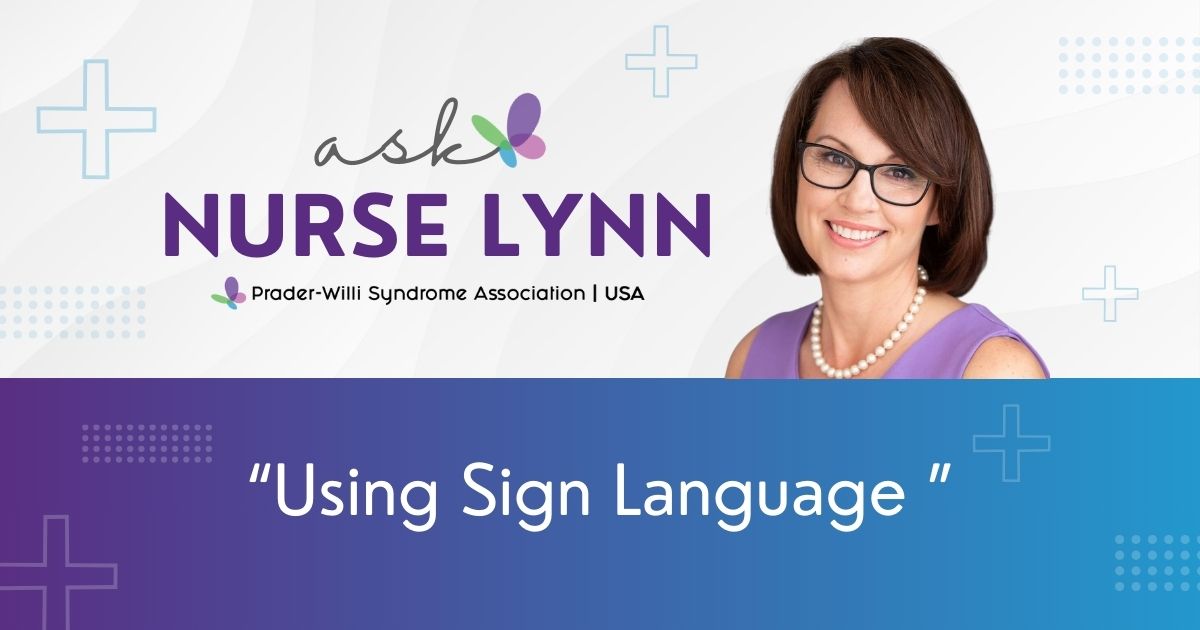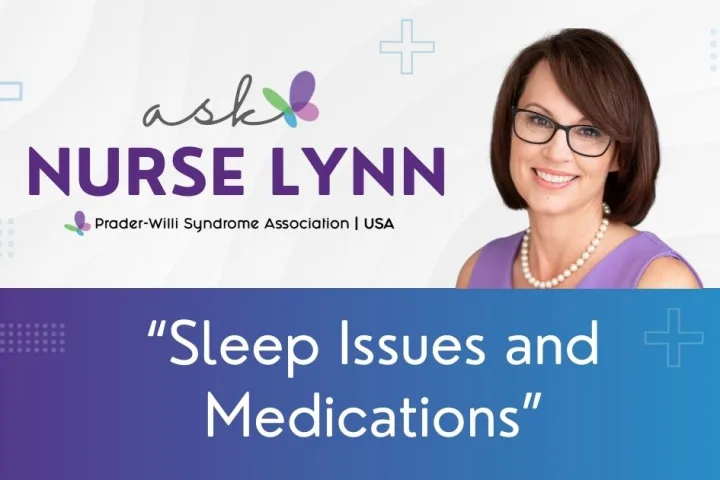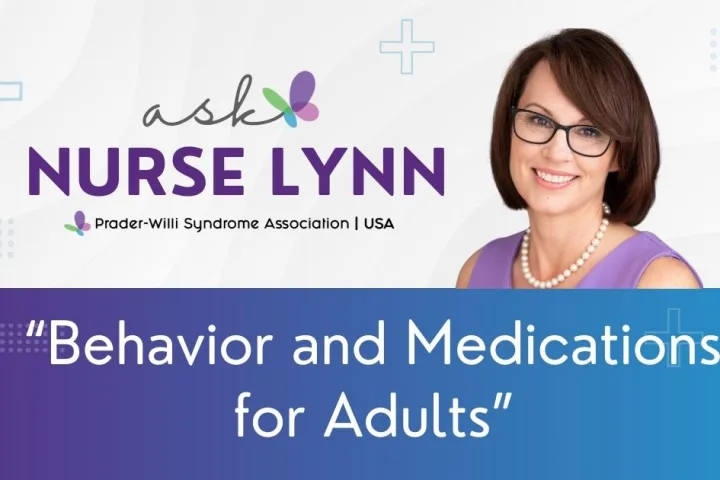Question:
Male, 6 years old, Deletion subtype
Understanding my son would have a speech impairment and rarely made sounds as a baby we took the chance with ASL, American Sign Language, as a tool to teach him expressive language. Early on when he was physically able to start making signs, we saw that our son was comforted emotionally with this method of communication. The school districts have given me a hard time with education and curriculum because he does not exhibit a hearing deficit. As he has grown, and behavioral disruptions become more apparent, ASL has been a method of communicating and calming him down when verbal communication does not work. Have other parents with PWS children found sign language as a tool to help their children excel with expressive communication or calm down emotional outbursts?
Nurse Lynn’s Response:
It sounds like you’ve been incredibly resourceful in finding ways to support your son’s communication and emotional needs. Using ASL for children with PWS can be a helpful tool, especially when verbal communication is challenging. Many children with PWS struggle with expressive language due to cognitive and motor difficulties, and ASL can offer a bridge to understanding, both for the child and the caregivers.
From what other parents have shared, ASL or other forms of sign language have been used successfully to reduce frustration and emotional outbursts in some children with PWS. The visual and physical nature of sign language can be particularly effective in calming children when words are hard to express or understand. It allows for a more direct way of communicating basic needs, feelings, and desires, which can be reassuring and reduce anxiety, especially when verbal communication is not fully developed.
However, challenges do exist in some cases. Schools and other professionals may not always be equipped to support sign language learning, especially if they are focused on verbal communication as the primary method of education. Your experience with the school district’s resistance is something other parents have faced as well.
We do have experts on the PWSA| USA staff who work with schools on ensuring the right supports are being delivered to our children. If you would like more information on who to reach out to, I would be happy to assist you. I have linked our school success webpage which has loads of useful information.
Resources:
School Success – Prader-Willi Syndrome Association | USA
Do you have a question for Nurse Lynn? Submit your question here:
Share this!





 Perry A. Zirkel has written more than 1,500 publications on various aspects of school law, with an emphasis on legal issues in special education. He writes a regular column for NAESP’s Principal magazine and NASP’s Communiqué newsletter, and he did so previously for Phi Delta Kappan and Teaching Exceptional Children.
Perry A. Zirkel has written more than 1,500 publications on various aspects of school law, with an emphasis on legal issues in special education. He writes a regular column for NAESP’s Principal magazine and NASP’s Communiqué newsletter, and he did so previously for Phi Delta Kappan and Teaching Exceptional Children. Jennifer Bolander has been serving as a Special Education Specialist for PWSA (USA) since October of 2015. She is a graduate of John Carroll University and lives in Ohio with her husband Brad and daughters Kate (17), and Sophia (13) who was born with PWS.
Jennifer Bolander has been serving as a Special Education Specialist for PWSA (USA) since October of 2015. She is a graduate of John Carroll University and lives in Ohio with her husband Brad and daughters Kate (17), and Sophia (13) who was born with PWS. Dr. Amy McTighe is the PWS Program Manager and Inpatient Teacher at the Center for Prader-Willi Syndrome at the Children’s Institute of Pittsburgh. She graduated from Duquesne University receiving her Bachelor’s and Master’s degree in Education with a focus on elementary education, special education, and language arts.
Dr. Amy McTighe is the PWS Program Manager and Inpatient Teacher at the Center for Prader-Willi Syndrome at the Children’s Institute of Pittsburgh. She graduated from Duquesne University receiving her Bachelor’s and Master’s degree in Education with a focus on elementary education, special education, and language arts. Evan has worked with the Prader-Willi Syndrome Association (USA) since 2007 primarily as a Crisis Intervention and Family Support Counselor. Evans works with parents and schools to foster strong collaborative relationships and appropriate educational environments for students with PWS.
Evan has worked with the Prader-Willi Syndrome Association (USA) since 2007 primarily as a Crisis Intervention and Family Support Counselor. Evans works with parents and schools to foster strong collaborative relationships and appropriate educational environments for students with PWS. Staci Zimmerman works for Prader-Willi Syndrome Association of Colorado as an Individualized Education Program (IEP) consultant. Staci collaborates with the PWS multi-disciplinary clinic at the Children’s Hospital in Denver supporting families and school districts around the United States with their child’s Individual Educational Plan.
Staci Zimmerman works for Prader-Willi Syndrome Association of Colorado as an Individualized Education Program (IEP) consultant. Staci collaborates with the PWS multi-disciplinary clinic at the Children’s Hospital in Denver supporting families and school districts around the United States with their child’s Individual Educational Plan. Founded in 2001, SDLC is a non-profit legal services organization dedicated to protecting and advancing the legal rights of people with disabilities throughout the South. It partners with the Southern Poverty Law Center, Protection and Advocacy (P&A) programs, Legal Services Corporations (LSC) and disability organizations on major, systemic disability rights issues involving the Individuals with Disabilities Education Act (IDEA), Americans with Disabilities Act (ADA), and the federal Medicaid Act. Recently in November 2014, Jim retired.
Founded in 2001, SDLC is a non-profit legal services organization dedicated to protecting and advancing the legal rights of people with disabilities throughout the South. It partners with the Southern Poverty Law Center, Protection and Advocacy (P&A) programs, Legal Services Corporations (LSC) and disability organizations on major, systemic disability rights issues involving the Individuals with Disabilities Education Act (IDEA), Americans with Disabilities Act (ADA), and the federal Medicaid Act. Recently in November 2014, Jim retired.